新视野大学英语4第四版Unit1sectionA教案
新视野大学英语第四册教案unit1
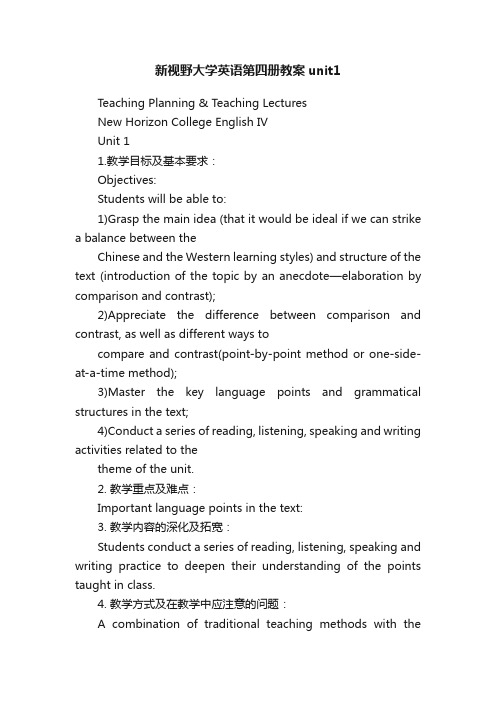
新视野大学英语第四册教案unit1Teaching Planning & Teaching LecturesNew Horizon College English IVUnit 11.教学目标及基本要求:Objectives:Students will be able to:1)Grasp the main idea (that it would be ideal if we can strikea balance between theChinese and the Western learning styles) and structure of the text (introduction of the topic by an anecdote—elaboration by comparison and contrast);2)Appreciate the difference between comparison and contrast, as well as different ways tocompare and contrast(point-by-point method or one-side-at-a-time method);3)Master the key language points and grammatical structures in the text;4)Conduct a series of reading, listening, speaking and writing activities related to thetheme of the unit.2. 教学重点及难点:Important language points in the text:3. 教学内容的深化及拓宽:Students conduct a series of reading, listening, speaking and writing practice to deepen their understanding of the points taught in class.4. 教学方式及在教学中应注意的问题:A combination of traditional teaching methods with thecommunicative approach will beadopted. Special attention should be paid to classroom interaction. Give students time to adapt to the new teaching mode in the university that are quite different from the one they were used to in the middle school. More encouragement is needed and more guidance will be given to them in their extracurricular study.5. 教学内容及学时分配:Time allotment:1st period: pre-reading; text organization2nd period: while-reading (Paras 1-5)3rd period: while-reading (Paras 6-13)4th period: while-reading (Paras 6-13 continued, Para 14)5th period: post-reading activities (Debate; Exercises)6th period: Check on students’ home reading (Text B); Theme- Related Language Learning T asks)6. 主要参考书目:郑树棠,胡全生,2003,《新视野大学英语综合教程4-教师用书》。
新视野大学英语读写教程第4册教案doc新视野大学英语教案
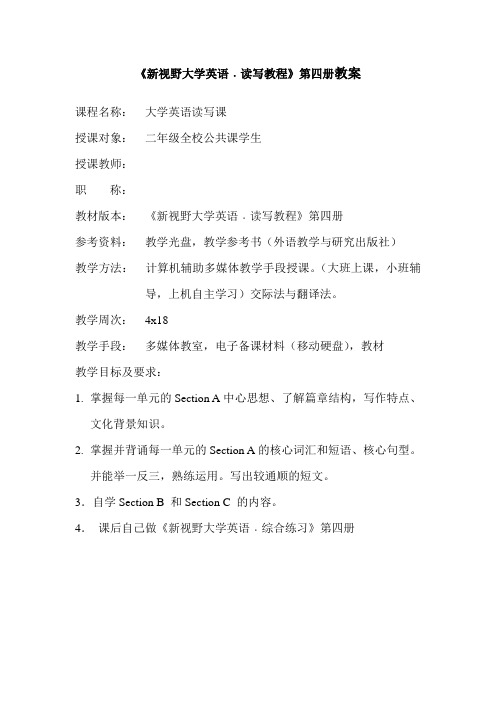
《新视野大学英语﹒读写教程》第四册教案课程名称:大学英语读写课授课对象:二年级全校公共课学生授课教师:职称:教材版本:《新视野大学英语﹒读写教程》第四册参考资料:教学光盘,教学参考书(外语教学与研究出版社)教学方法:计算机辅助多媒体教学手段授课。
(大班上课,小班辅导,上机自主学习)交际法与翻译法。
教学周次:4x18教学手段:多媒体教室,电子备课材料(移动硬盘),教材教学目标及要求:1.掌握每一单元的Section A中心思想、了解篇章结构,写作特点、文化背景知识。
2.掌握并背诵每一单元的Section A的核心词汇和短语、核心句型。
并能举一反三,熟练运用。
写出较通顺的短文。
3.自学Section B 和Section C 的内容。
4.课后自己做《新视野大学英语﹒综合练习》第四册新视野大学英语教案Unit One (Book Four)一、教学内容(Content of the Course)Section A. The Temptation of a Respectable Woman (精讲)Section B. The Obligations and Responsibilities to Marriage(略讲)Section C. The Positive Meanings of Love (泛读)二、教学对象(Audience)三、教学时间(Teaching Span)6-7学时四、教学目的(Teaching Aims)1.Appreciate the text to know sth. about what happened between Mrs. Baroda and her husband’s friend.2. Learn to use some important words, expressions and sentence patterns.3. Practice listening, speaking, reading and writing.4. Learn some translation skills五、教学任务及步骤(Instruction Objectives &. Teaching Procedures)Step One Pre-reading Activities (导入)文章主题(Themes)10 minutes课文A向我们讲述了一位女性与她丈夫的一位生性沉默的朋友一起度过的一段时间,描写了她对这位朋友在感情上发生的变化。
新视野第四册unit1 sectionA
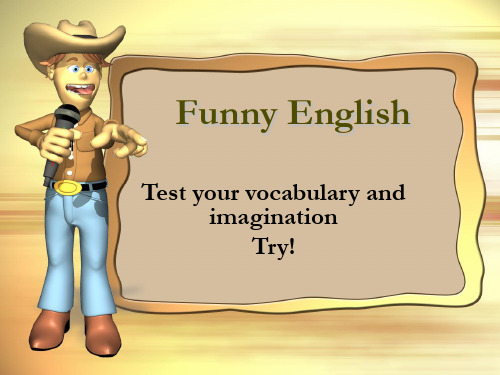
• 若表演者、画家或作家感到厌烦, 他们的作品就难以继续保持以前的 吸引力,也就难以保持公众的注意 力。公众的热情消磨以后,就会去 追捧下一个走红的人。
hasbeen star
• Paras 4 • Their distinct styles marked a significant change in form from others and gained them fame and fortune. However, they paid for it by giving up the freedom to express themselves with other styles or forms.
Compound Dictation
The word “winner” and “loser” have many meanings. When we refer to a person as a winner, we do not mean one who makes someone else lose. To us, a winner is one who responds authentically (真正地) by being credible, [S4] ___________, responsive, and trustworthy genuine, both as an [S5] _________ and as a individual member of a society.
Part Ⅴ
• Examples of those who failed many times before their final success. • (Para. 8)
• Conclusion(Para. 9) • The writer’s advice to those seeking fame and fortune. • Try to be happy with who you are and what you do. Try to do work that you can be proud of. Maybe you won’t be famous in your own lifetime, but you may creat better art.
新视野大学英语4第四版Unit1sectio

新视野大学英语4第四版Unit1sectionA教案Unit 1 Section ALove and logic: The story of a fallacyObjectives:➢To talk about love and logic➢To further understand the text➢To apply the phrases and patterns➢To master the narrative essay writing skillContents➢Warming-up Activities➢Text Study➢Language Application➢SummaryWarming-up ActivitiesLead-in1.What do you know about logic?When it comes to making a choice, many people tend to use rational and logical reasoning;Males are more rational than females;2. Do you think it is possible to deal with life in a completely rational and logical way?Rational world is not necessarily awonderful one;Rational individuals can make choices that are bad news for others;It is ridiculous to deal with love in a logical way.Pre-reading Activities1. The following are some statements to test your reasoning ability. Tell whether the conclusions after the word “Therefore” are true (T), false (F), or uncertain (U). Write your answer on the line before each statement.num ber statements Trueorfalse1All odd numbers are integers (整数). All even numbersare integers. Therefore, all odd numbers are evennumbers.2 There are no dancers that aren’t slim and no singersthat aren’t dancers.Therefore, all singers areslim.3 A toothpick (牙签) is useful.Useful things are valuable.Therefore, atoothpick is valuable.Three pencils cost the same astwo erasers. Fourerasers cost thesame as one ruler. Therefore,pencilsare more expensivethan rulers.5 Class A has a higherenrollment than Class B. ClassC has a lowerenrollment than Class B.Therefore,Class A has a lowerenrollment than Class C.6 A fruit basket contains moreapples than lemons.There are morelemons in the basket thanoranges.Therefore, thebasket contains more applesthanoranges.7 Taking the train across town isquicker than takingthe bus. Taking thebus across town is slower thandriving a car.Therefore, taking the trainacross townis quicker thandriving a car.8 All the tulips in Zoe’s gardenare white. All the rosesin Zoe’s garden areyellow. Therefore, all theflowersin Zoe’s garden areeither white or yellow.2. Listen to a short passage on logic, and fill in the missing information.Cultural Background- Logic and Fallacy1. What is a fallacy? And how is it used?An error in reasoning that renders an argument logically invalid;By accident or design, logical fallacies are often used in debate or propaganda;To mislead people;To distract people from the real issue for the purpose of winning an argument.2. How many types of fallacy do you know?Red Herring (转移话题)/Begging theQuestion(循环论证)/Slippery Slope(滑坡谬误)/Bandwagon (从众谬误)/False Dilemma (伪两难谬误)/FalseCause (post hoc) (假因谬误)/AdHominem ( 人身攻击)/Appeal toAuthority (诉诸权威)/DictoSimpliciter (绝对判断)/HastyGeneralization (草率结论)/AdMisericordiam (文不对题)/FalseAnalogy (错误类比)Text Study1. Main idea and structure✧What did the narrator do with his roommateRob? (Para.1)They made a deal that the narratorgives Rob his leather jacket, and Rob,in exchange, gives the narrator hisgirlfriend.✧Why did the narrator want to have Polly ashis girl friend? (Paras. 2-3)Pretty, well-off, radiant;The right background to be the girlfriend of a dogged, brilliant lawyer;Help the narrator in his competition with other applicants to some elite law firms.●Part I — Paras. 1–3The author sets the scene of the story by providing information about the four “wh-” words: who, where, what, and why. “Who” refers to the narrator, his roommate Rob, and the beautiful girl Polly. “Where”refers to . “What”and “why” refer to what to do and why to do it: The narrator decides to make Polly “”because as a promisingly brilliant lawyer, he wants to have a girlfriend who is not only beautiful but also intelligent.●Part II — Paras. 4-25The narrator tries to help Polly become smarter by giving her lessons in logic. Altogether he spends five nights teaching Polly four logical fallacies , namely, Dicto Simpliciter,Hasty Generalization , Ad Misericordiam, False Analogy.●Part III — Paras. 26-43When asked to be the narrator’s girl friend, Polly refutes his arguments with the exact logical fallacies taught by him and refuses by making full disclosure that she is datingthe narrator simply because it is a trick she and Rob have decided to play on him in order to get his leather jacket .2. Structure of the textIntroduction to the story.The narrator and Rob make a deal: the exchange of a leather jacket for Polly. (Para. 1)Polly has some basicqualities to be the girlfriendof a lawyer.(Para. 2)Polly needs to be mademore intelligent. (Para. 3)Body (Development of the story)Why logic is important (Para. 4-8)The first logicalfallacy taughtto Polly: DictoSimpliciter(Paras. 9-11)e second logicalfallacy taughtto Polly: HastyGeneralization(Paras. 12-15)The third logicalfallacy taught toPolly: AdMisericordiam(Paras. 16-21)The fourthlogical fallacytaught to Polly:False Analogy(Paras. 22-25)3. Summary of the textClimax & End“We make a pretty good couple.”HastyGeneraliza-tio n. (Paras. 26-30)“You don ’t have to eat a whole cake to know it ’s good.” False Analogy.(Paras. 31-32)“Please say you ’ll go out with me. I ’m nothing without you.” AdMisericordiam. (Paras. 33-35)“You know the things you learn in school don ’t have anything to do with real life.” Dicto Simpliciter. (Paras. 36-37)Climax of the story: Polly refuses to be the narrator ’s girlfriend.(Paras. 38-43) Love and logic: The story of a fallacyMy roommate Rob made a pact with me that he’d give me his girlfriend Polly in exchange for my jacket. And I agreed.Polly had the right background to be the girlfriend of a dogged, brilliant lawyer like4. Practical phrasesPractical Phrases Specific Meanings Examples1. In exchange for…作为对……的交换In exchange for a peacefulenvironment for the futuregenerations, our revolutionarypredecessors shed their blood andeven sacrificed their precious lives.2. Set a date for为……定日期In order to achieve success, one hadbetter start immediately rather thanset dates for his/her efforts.3. Appeal to唤起;吸引This university boasts manyworld-famous experts, professors,and the world’s best researchlibrary, therefore, it appeals tostudents and researchers from allover the world.4. make/draw an analo gy between 在……之间作类比We often make an analogy betweenstudying and climbing a mountain:both of them require great effortsbefore you can reach the top.5. Make sth. out of sb./sth.使……变成……The aim of the military academy is to make qualified officers out of the young cadets after four years’ study and training.6. Give sb. the axe抛弃(恋人);解雇If you continue playing yourprecious college years away, successwill give you the axe upongraduation.7. Be dripping with …满是……Though the beautiful lady isdripping with jewels, her words andactions are dripping with vulgarityand rudeness.5. Functional patternsFunctional Patterns Functions & Usages Examples1. If sb. could do …,sb. just might do …用于表达“假设”如果我能够让我所申请的顶尖律师事务所看到我身边伴随着一位光彩照人、谈吐优雅的另一半,我就很有可能在竞聘中以微弱优势获胜。
新视野大学英语视听说教程教案第四册unit1

Difficult Points
Making and accepting suggestions;
Teaching
Methods &
Techniques
Introduction ; Student–oriented listening & speaking method
Further listening & Speaking
1. Mention at least three reasons people get angry. What can we do to control our anger?
People tend to get angry when treated unfairly. Specifically, we may fly into a rage when we realize we were betrayed by a close friend or tricked by a clerk into buying something unnecessary at a high price. When people treat us with contempt, or deliberately ignore us, we may get annoyed. ‘also the sight of injustice often fills us with indignation. For instance, when we see a child being bullied by a group of hoodlums, it makes our blood boil.
新视野大学英语4unit1 section A

- 16 -
Pre-reading Activities
• Choose your friends carefully. • Think about how an honorable person would act. • Think about what would happen if you were caught. • Think over whether what you are about to do may hurt
conducts.
- 17 -
Unit One 1 Pre-reading Activities 2 Text Understanding 3 Language Points 4 Summary 5 Writing
- 18 -
Text Understanding
read the text and answer the following questions. 1. How many characters are there in the 2. story? Who are they?
supervisor)
-8-
Pre-reading Activities
I. What would you do in the following cases?
-9-
Pre-reading Activities
a. You’re overweight and not allowed to eat b. too much. When you see the delicious
-5-
Background Information
2.What is temptation?
Temptation is something that you crave for now but regret later. It isou anytime and from anywhere.
新视野大学英语4备课教案
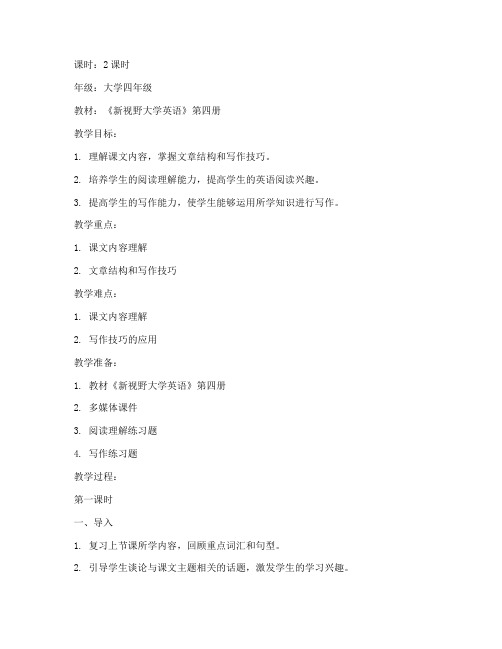
课时:2课时年级:大学四年级教材:《新视野大学英语》第四册教学目标:1. 理解课文内容,掌握文章结构和写作技巧。
2. 培养学生的阅读理解能力,提高学生的英语阅读兴趣。
3. 提高学生的写作能力,使学生能够运用所学知识进行写作。
教学重点:1. 课文内容理解2. 文章结构和写作技巧教学难点:1. 课文内容理解2. 写作技巧的应用教学准备:1. 教材《新视野大学英语》第四册2. 多媒体课件3. 阅读理解练习题4. 写作练习题教学过程:第一课时一、导入1. 复习上节课所学内容,回顾重点词汇和句型。
2. 引导学生谈论与课文主题相关的话题,激发学生的学习兴趣。
二、课文阅读1. 学生自读课文,理解课文内容。
2. 教师提问,检查学生对课文的理解程度。
3. 分析课文结构,讲解文章写作技巧。
三、课堂讨论1. 学生分组讨论课文中的重点段落,分享自己的理解。
2. 教师点评学生的讨论,引导学生深入理解课文。
四、练习1. 阅读理解练习:学生完成练习题,巩固课文内容。
2. 写作练习:学生根据课文主题,运用所学知识进行写作。
第二课时一、复习1. 复习上节课所学内容,回顾重点词汇和句型。
2. 检查学生的阅读理解练习和写作练习完成情况。
二、课文阅读1. 学生自读课文,理解课文内容。
2. 教师提问,检查学生对课文的理解程度。
3. 分析课文结构,讲解文章写作技巧。
三、课堂讨论1. 学生分组讨论课文中的重点段落,分享自己的理解。
2. 教师点评学生的讨论,引导学生深入理解课文。
四、写作指导1. 教师讲解写作技巧,指导学生如何运用所学知识进行写作。
2. 学生根据教师指导,完成写作练习。
五、总结1. 教师总结本节课所学内容,强调重点和难点。
2. 学生分享自己的学习心得,提出疑问。
教学反思:通过本节课的教学,学生能够理解课文内容,掌握文章结构和写作技巧。
在教学过程中,注重培养学生的阅读理解能力和写作能力,提高学生的英语学习兴趣。
在今后的教学中,将继续关注学生的学习情况,不断调整教学方法,提高教学效果。
新视野大学英语第四册教案完整版
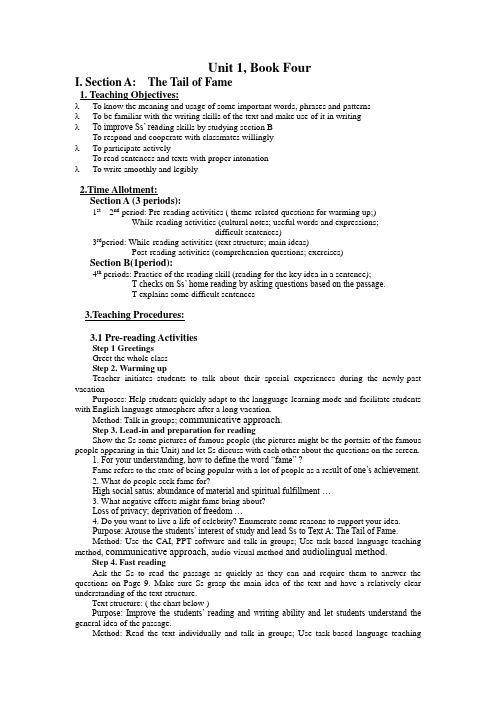
Unit 1, Book FourI. Section A: The Tail of Fame1. Teaching Objectives:λTo know the meaning and usage of some important words, phrases and patternsλTo be familiar with the writing skills of the text and make use of it in writingλTo improve Ss’ rea ding skills by studying section BTo respond and cooperate with classmates willinglyλTo participate activelyTo read sentences and texts with proper intonationλTo write smoothly and legibly2.Time Allotment:Section A (3 periods):1st---2nd period: Pre-reading activities ( theme-related questions for warming up;)While-reading activities (cultural notes; useful words and expressions;difficult sentences)3rd period: While-reading activities (text structure; main ideas)Post-reading activities (comprehension questions; exercises)Section B(1period):4th periods: Practice of the reading skill (reading for the key idea in a sentence);T checks on Ss’ home reading by asking questions based on the passage.T explains some difficult sentences3.Teaching Procedures:3.1 Pre-reading ActivitiesStep 1 GreetingsGreet the whole classStep 2. Warming upTeacher initiates students to talk about their special experiences during the newly-past vacationPurposes: Help students quickly adapt to the langguage-learning mode and facilitate students with English language atmosphere after a long vacation.Method: Talk in groups; communicative approach.Step 3. Lead-in and preparation for readingShow the Ss some pictures of famous people (the pictures might be the portaits of the famous people appearing in this Unit) and let Ss discuss with each other about the questions on the screen.1. For your understanding, how to define the word “fame” ?Fame refers to the state of being popular with a lot of people as a res ult of one’s achievement.2. What do people seek fame for?High social satus; abundance of material and spiritual fulfillment …3. What negative effects might fame bring about?Loss of privacy; deprivation of freedom …4. Do you want to live a life of celebrity? Enumerate some reasons to support your idea.Purpose: Arouse the students’ interest of study and lead Ss to Text A: The Tail of Fame.Method: Use the CAI, PPT software and talk in groups; Use task-based language teaching method, communicative approach, audio-visual method and audiolingual method.Step 4. Fast readingAsk the Ss to read the passage as quickly as they can and require them to answer the questions on Page 9. Make sure Ss grasp the main idea of the text and have a relatively clear understanding of the text structure.Text structure: ( the chart below )Purpose: Improve the students’ reading and writing ability and let students understand the general idea of the passage.Method: Read the text individually and talk in groups; Use task-based language teachingmethod, reading approach, communicative approach and total physical response method.Step 5. Preparation for details of the text on the screenSs are required to look at the words and phrases on the screen and give a brief presentation in class.Words and Phrases:Purpose:Train the Ss’ ability of understandi ng and using foreign language.Method: Talk in groups, Use task-based language teaching method, communicative approach and total physical response method.1)bankrupt: adj. without enough money to pay what one owesMany state-owned enterprises have gone bankrupt. 许多国有企业都破产了。
(完整word版)新视野大学英语第四册第一单元教案

Unit1TheFirstTwoPeriodsStep 1: Warm—up 20m Questioning & DiscussingStep2: Structure10m LecturingStep 3: Language points and DifficultSentences30mLecturing, Questioning& Giving Examples Step 4: Comprehension of the Text15m Questioning & DiscussingStep 5: Text Structure Analysis(Writing Ways Mentioned in thePassage in Section A)10m LecturingStep 6: Summarize the passage orally10m Questioning & DiscussingStep 7: Homework5m LecturingTheSecondPeriodsStep 1: Revision of the key words andphrases in Section A10mLecturing, Questioning &Giving Examples Step 2: Exercises (Vocabulary,Translation, Essay Summary in SectionA)35m Questioning & Discussing Step 3: Reading Skills (The Passagein Section B)50mLecturing, Questioning& Giving Examples Step 4: Homework Assignment5m LecturingTheThirdTwoPeriodsStep 1:Revision of the readingskills, key words and phrases inSection B10mLecturing, Questioning& Giving Examples Step 2: Test One (自主测试)15m Questioning & DiscussingStep 3: Listening40mListening &QuestioningStep 4: Speaking30m Questioning & DiscussingStep 5: Homework Assignment5m Lecturing教学过程The First Two PeriodsStep 1: Warm—up (20m)1. What is temptation? Do you have the experience of being tempted? 2。
新视野大学英语4第四版Unit1sectionA教案
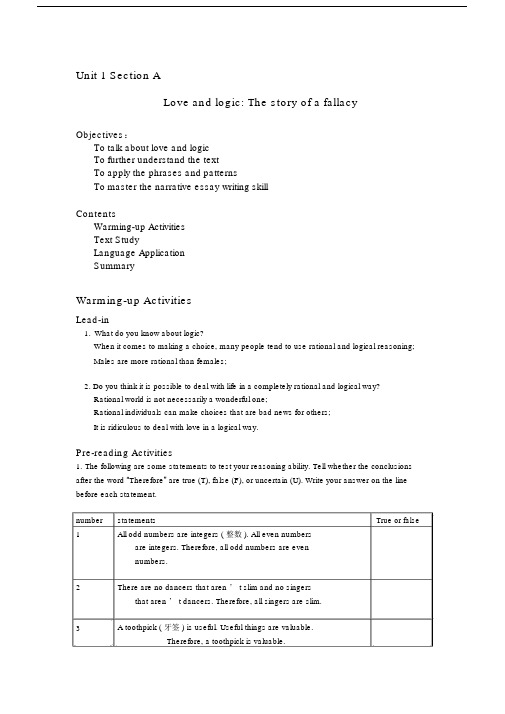
Unit 1 Section ALove and logic: The story of a fallacy Objectives:To talk about love and logicTo further understand the textTo apply the phrases and patternsTo master the narrative essay writing skillContentsWarming-up ActivitiesText StudyLanguage ApplicationSummaryWarming-up ActivitiesLead-in1.What do you know about logic?When it comes to making a choice, many people tend to use rational and logical reasoning;Males are more rational than females;2.Do you think it is possible to deal with life in a completely rational and logical way?Rational world is not necessarily a wonderful one;Rational individuals can make choices that are bad news for others;It is ridiculous to deal with love in a logical way.Pre-reading Activities1.The following are some statements to test your reasoning ability. Tell whether the conclusions after the word “Therefore” are true (T), false (F), or uncertain (U). Write your answer on the line before each statement.number statements True or false 1All odd numbers are integers ( 整数 ). All even numbersare integers. Therefore, all odd numbers are evennumbers.2There are no dancers that aren ’ t slim and no singersthat aren ’ t dancers. Therefore, all singers are slim.3 A toothpick ( 牙签 ) is useful. Useful things are valuable.Therefore, a toothpick is valuable.Three pencils cost the same as two erasers. Fourerasers cost the same as one ruler. Therefore, pencilsare more expensive than rulers.5Class A has a higher enrollment than Class B. ClassC has a lower enrollment than Class B. Therefore,Class A has a lower enrollment than Class C.6 A fruit basket contains more apples than lemons.There are more lemons in the basket than oranges.Therefore, the basket contains more apples thanoranges.7Taking the train across town is quicker than takingthe bus. Taking the bus across town is slower thandriving a car. Therefore, taking the train across townis quicker than driving a car.8All the tulips in Zoe ’ s garden are white. All the rosesin Zoe’ s garden are yellow. Therefore, all the flowersin Zoe’ s garden are either white or yellow.2. Listen to a short passage on logic, and fill in the missing information.Cultural Background- Logic and Fallacy1.What is a fallacy? And how is it used?An error in reasoning that renders an argument logically invalid;By accident or design, logical fallacies are often used in debate or propaganda;To mislead people;To distract people from the real issue for the purpose of winning an argument.2.How many types of fallacy do you know?Red Herring ( 转移话题)/Begging the Question( 循环论证)/Slippery Slope (滑坡谬误)/Bandwagon ( 从众谬误 )/False Dilemma ( 伪两难谬误 )/False Cause (post hoc) (假因谬误 )/Ad Hominem (人身攻击)/Appeal to Authority (诉诸权威)/Dicto Simpliciter (绝对判断)/Hasty Generalization (草率结论 )/Ad Misericordiam (文不对题 )/False Analogy (错误类比 )Text Study1. Main idea and structureWhat did the narrator do with his roommate Rob? (Para.1)They made a deal that the narrator gives Rob his leather jacket, and Rob, in exchange,gives the narrator his girlfriend.Why did the narrator want to have Polly as his girl friend? (Paras. 2-3)Pretty, well-off, radiant;The right background to be the girlfriend of a dogged, brilliant lawyer;Help the narrator in his competition with other applicants to some elite law firms.Part I — Paras. 1– 3The author sets the scene of the story by providing information about the four“ wh-”words: who, where, what, and why.“Who” refers to the narrator, his roommate Rob, and the beautiful girl Polly. “ Where ” refers to. “What ” and “ why ” referto what to do and why to do it: The narrator decides to make Polly“” because as a promisingly brilliant lawyer, he wants to have a girlfriend who is not only beautiful but also intelligent.Part II — Paras. 4-25The narrator tries to help Polly become smarter by giving her lessons in logic. Altogether he spends five nights teaching Polly four logical fallacies , namely, Dicto Simpliciter,Hasty Generalization , Ad Misericordiam, False Analogy.Part III — Paras. 26-43When asked to be the narrator ’s girl friend, Polly refutes his arguments with the exactlogical fallacies taught by him and refuses by making full disclosure that she is dating the narrator simply because it is a trick she and Rob have decided to play on him in order to get his leather jacket.2. Structure of the text.The narrator and Rob make a deal: the exchange of a leather jacket for Polly. (Para. 1)Introduction to the storyPolly has some basic Polly needs to be made more qualities to be the girlfriend of intelligent . (Para. 3)a lawyer.(Para. 2)Body (Development of the story)Why logic is The first logical e second logical The third logical The fourth logical important(Para.fallacy taught to fallacy taught to fallacy taught to fallacy taught to 4-8)Polly: Dicto Polly: Hasty Polly: Ad Polly: FalseSimpliciter Generalization Misericordiam Analogy (Paras.(Paras. 9-11)(Paras. 12-15)(Paras. 16-21)22-25)Climax & End“We make a pretty good couple. ”Hasty Generaliza-tion. (Paras. 26-30)“You don’thaveto eat a wholecake to knowit’s good. ”False Analogy.(Paras. 31-32)Climax of the“Please saystory:you ’llgo out withme. I ’m nothingPolly refuses towithout you. ”be the narrator’sAdgirlfriend.Misericordiam.(Paras. 38-43)(Paras. 33-35)“You know thethings you learn inschool don ’thaveanything to do withreal life. ”Dicto Simpliciter.(Paras. 36-37)3. Summary of the textLove and logic: The story of a fallacyMy roommate Rob made a pact with me that he’ dgive me his girlfriend Polly in exchange for my jacket. And I agreed.Polly had the right background to be the girlfriend of a dogged, brilliant lawyer like myself. She was pretty,well-off,and radiant.Still,I want to dispense her enough pearls of wisdom to make her“-spokenwell ” .So I tried my best to teach her such logical fallacies as Dicto Simpliciter, Hasty Generalization, Ad Misericordiam,and False Analogy.After five nights of diligent work,I actually made a logician out of Polly. She was an analytical thinker at last.When I asked her to develop our relationship into a romantic one,however,she refuted my arguments as those logical fallacies I had taught her! And she refused my proposition by making full disclosure: She liked Rob in leather, therefore, she had told him to make the pact with me so that Rob could have my jacket .4. Practical phrasesPractical Phrases Specific Meanings Examples1. In exchange for ⋯作为对⋯⋯的交换In exchange for a peaceful environmentfor the future generations, ourrevolutionary predecessors shed theirblood and even sacrificed theirprecious lives.2. Set a date for为⋯⋯定日期3. Appeal to唤起;吸引In order to achieve success, one had better start immediately rather than set dates for his/her efforts.This university boasts many world-famous experts, professors, and the world ’ s best research library,4.make/draw an analo gy between5.Make sth. out of sb./s th.6.Give sb. the axe7. Be dripping with⋯therefore, it appeals to students andresearchers from all over the world.在⋯⋯之间作类比We often make an analogy betweenstudying and climbing a mountain:both of them require great effortsbefore you can reach the top.The aim of the military academy is to使⋯⋯变成⋯⋯make qualified officers out of theyoung cadets after four years’ studyand training.抛弃(恋人);解雇If you continue playing your preciouscollege years away, success will giveyou the axe upon graduation.满是⋯⋯Though the beautiful lady is drippingwith jewels, her words and actions aredripping with vulgarity and rudeness.5. Functional patternsFunctional Patterns Functions & Usages Examples如果我能够让我所申请的顶尖律师事务所看到我身边伴随着一位光彩照人、谈吐优雅的另一1. If sb. could do⋯,s半,我就很有可能在竞聘中以微弱优势获胜。
新视野大学英语4课件unit1 section A(ppt课件)

Unit One 1 Pre-reading Activities 2 Text Understanding 3 Language Points 4 Summary 5 Writing
-4-
Background Information
1. What do these two pictures remind you of?
-7-
Background Information
In general, temptation stems from three major sources:
a. lust for sensual pleasures (3 minutes in classroom too long, three hours with
- 15 -
Pre-reading Activities
II. How to Resist Temptations ?
It’s inevitable for one to be faced with various temptations in his lifetime. Have you ever managed to resist any temptation or got trapped in it? Now share your experience with your partner.
- 13 -
Pre-reading Activities
e. Staying in bed is so comfortable. But it’s time for class …
- 14 -
Pre-reading Activities
f. The computer game is so fascinating, but you haven’t finished your homework …
新视野大学英语4unit1教案
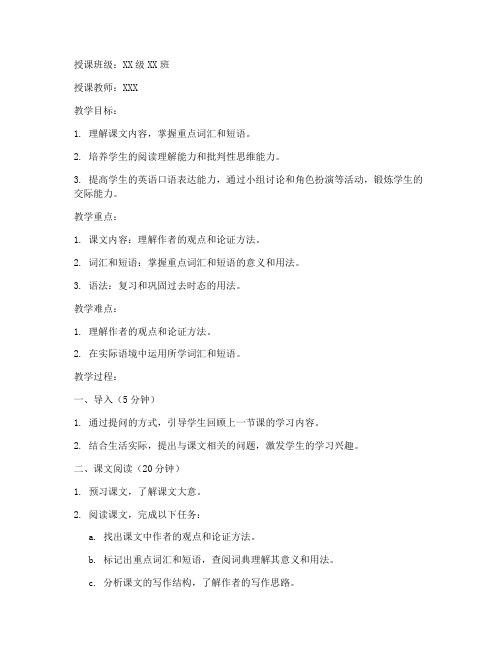
授课班级:XX级XX班授课教师:XXX教学目标:1. 理解课文内容,掌握重点词汇和短语。
2. 培养学生的阅读理解能力和批判性思维能力。
3. 提高学生的英语口语表达能力,通过小组讨论和角色扮演等活动,锻炼学生的交际能力。
教学重点:1. 课文内容:理解作者的观点和论证方法。
2. 词汇和短语:掌握重点词汇和短语的意义和用法。
3. 语法:复习和巩固过去时态的用法。
教学难点:1. 理解作者的观点和论证方法。
2. 在实际语境中运用所学词汇和短语。
教学过程:一、导入(5分钟)1. 通过提问的方式,引导学生回顾上一节课的学习内容。
2. 结合生活实际,提出与课文相关的问题,激发学生的学习兴趣。
二、课文阅读(20分钟)1. 预习课文,了解课文大意。
2. 阅读课文,完成以下任务:a. 找出课文中作者的观点和论证方法。
b. 标记出重点词汇和短语,查阅词典理解其意义和用法。
c. 分析课文的写作结构,了解作者的写作思路。
三、课堂讨论(15分钟)1. 小组讨论:针对课文内容,进行深入讨论,分享自己的观点和看法。
2. 教师点评:针对学生的讨论,进行点评和总结,强调重点和难点。
四、词汇和短语学习(10分钟)1. 列举课文中的重点词汇和短语,进行讲解和示范。
2. 学生跟读,练习发音和用法。
3. 进行词汇和短语的应用练习,巩固所学知识。
五、语法讲解(10分钟)1. 复习和巩固过去时态的用法。
2. 通过例句和练习,让学生熟练掌握过去时态的构成和用法。
六、角色扮演(10分钟)1. 将学生分成小组,根据课文内容进行角色扮演。
2. 学生通过角色扮演,提高口语表达能力,锻炼交际能力。
七、总结(5分钟)1. 教师总结本节课的学习内容,强调重点和难点。
2. 学生回顾本节课的学习内容,提出疑问。
教学评价:1. 课后作业:完成课后练习,巩固所学知识。
2. 小组讨论:观察学生在小组讨论中的表现,评价其批判性思维能力和交际能力。
3. 角色扮演:评价学生在角色扮演中的表现,评价其口语表达能力和交际能力。
新视野大学英语第四册第一单元教案
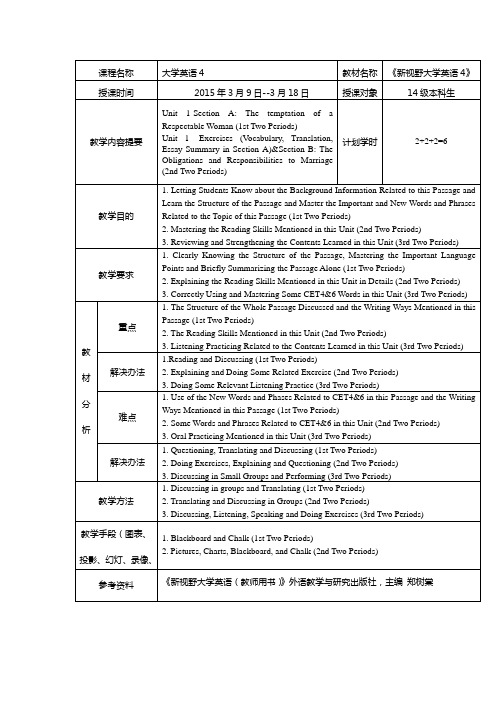
课堂设计主要内容拟用表达方式Unit1 TheFirstTwoPeriodsStep 1: Warm-up 20m Questioning & DiscussingStep2: Structure 10m LecturingStep 3: Language points and Difficult Sentences 30mLecturing, Questioning &Giving Examples Step 4: Comprehension of the Text 15m Questioning & DiscussingStep 5: Text Structure Analysis (Writing WaysMentioned in the Passage in Section A)10m LecturingStep 6: Summarize the passage orally 10m Questioning & DiscussingStep 7: Homework 5m LecturingTheSecondPeriodsStep 1: Revision of the key words and phrases inSection A10mLecturing, Questioning &Giving Examples Step 2: Exercises (V ocabulary, Translation, EssaySummary in Section A)35m Questioning & Discussing Step 3: Reading Skills (The Passage in Section B) 50mLecturing, Questioning &Giving Examples Step 4: Homework Assignment 5m LecturingTheThirdTwoPeriodsStep 1: Revision of the reading skills, key wordsand phrases in Section B10mLecturing, Questioning &Giving Examples Step 2: Test One (自主测试)15m Questioning & DiscussingStep 3: Listening 40m Listening & QuestioningStep 4: Speaking 30m Questioning & DiscussingStep 5: Homework Assignment 5m Lecturing教学过程The First Two PeriodsStep 1: Warm-up (20m)1. What is temptation? Do you have the experience of being tempted?2. If you were a married man or woman, you find a man or a woman who is very attractive to you, what would you do?3. How do you deal with a quiet stranger? Are you a sensible person or an emotional person? What is your moral standard?Step2: Structure (10m)Part I (Para 1): The general situation of the story, also the starting point of the story. Mrs. Baroda was a little annoyed that her husband’s friend--- Gouvernail, was to spend a week or two on their plantation.Part II (Paras2—10): What happened and Mrs. Baroda’s impressions of her guest.Part III (Para 11--19): What happened that night and some sort of emotional change in Mrs. Baroda but all this came along with a succession of actions.Part IV (Par20): What happened the day after “that night”. Next morning, Mrs. Baroda took an early train without even saying farewell. She did not return until Gouvernail was gonePart V (Par21): What happened during the time after “that night”. Durin g the summer that followed, Mr. Baroda greatly desired that his friend come to visit them again but this was vigorously opposed by Mrs. Baroda.Part VI (Par22--24): Before the year ended, Mr. Baroda was surprised and delighted to hear that Mrs. Baroda proposed to have Gouvernail visit them again as she had overcome everything--- the temptation.Step 3: Language points and Difficult Sentences (30m)Part I: Difficult Words and Phrases1. temptation :un. the action of tempting sb. or the state of being temptede.g. If you can’t resist buying things, shop by telephone to avoid temptation.cn. a thing that tempts or attracts sb.e.g. The bag of sweets on the table was too strong a temptation for the child to resist.e.g. Clever advertisements are just temptations to spend money.tempt : v. 1) persuade or try to persuade sb to do sth wrong or foolishe.g. He was tempted into making a false step.2) attract sb to have or do sthe.g. The warm weather tempted us to go for a swim.2. for the most part : in most cases; mostly (Para.2)e.g. For the most part the children are very healthy.e.g. The people of this town are , for the most part , quiet and well-behaved.3. Then she imposed her company upon him … (Para.2)impose one’s company/ones elf upon sb: force one’s company or oneself on sbe.g. Don’t impose your company on people who don’t want you .4. idle : adj. (Para.2)1) having no particular purposee.g. I don’t know why I asked – just idle curiosity .2) lazy; wasting time The First Two PeriodsStep 3: Language points and Difficult SentencesPart I: Difficult Words and Phrases 18. …of the days of keen ambitions and large intentions… (Para.16)keen :adj.1) extreme; strong; activee.g. He took a keen interest in domestic affairs.e.g. The children watched the clowns with keen delight. 2) eager; anxious to do things (on)e.g. He wasn’t keen on buying a car, but we talked him into it.e.g. He is very keen on the girl next door. syn : eager, anxious 3) (of points and edges) sharpe.g. The knife was old, but the blade had a keen edge. 4) active ; sensitive; sharpe.g. He had always kept a keen eye on what was happening around.syn: acute, aware, sensitive19. His words became ae.g. He is an idle, useless student .3) not working or operating productivelye.g. Owing to the electricity strike, a lot of factory workers were left idle .e.g. During the business depression half the machines in the factory were idle .5. …to press her atte mpt to penetrate the silence …(Para.2)penetrate : v. move into or throughe.g. Our eyes could not penetrate the darkness .e.g. Not many people managed to penetrate my disguise .penetration : n. the act or process of penetratinge.g. The company has had a successful first year at home but penetration of the international market has been slow .e.g. The heavier the arrow, the greater its penetration into the target.penetrative : adj. able to penetrate easily; intelligente.g. This is a penetrative analysis.compare:penetrating: a. (of the eye, sight, a question, etc)sharp and searching; (of a person, the mind, etc.) able to understand clearly and deeply; (of a sound) sharp and loude.g. He had an extraordinarily penetrating gaze.e.g. I was trying to think up another penetrating question.e.g. Her voice is so harsh and penetrating.6. for my part : as far as I am concerned; speaking for myself (Para.3)e.g. For my part, I don’t care who wins.e.g. I for my part still distrust you.7. …gathered h is arms around her waist and looked merrily into her troubled eyes . (Para.6)merrily : adv. in a cheerful way; cheerfullye.g. The children are playing in the garden merrily.merry : adj. happy; cheerful; bright and gaye.g. He wished them all a merry Christmas.e.g. We had a merry time at the party.8. “ Even I can never count upon how you are going to act under given conditions …”(Para.7)count upon / on : expect ; depend one.g. I didn’t count on John arriving so early.e.g. She can always be counted on for support.9. “ taking poor Gouvernail seriously and making a fuss about him …”(Para.7)make a fuss about : complain stronglye.g. I’m going to have to make a fuss about the service in this restaurant .e.g. There’s no point making a fuss about i t.10.But the poor fellow is run down by too much work now.(Para.9)run down : tire ; (cause to) be in an increasingly worse conditione.g. He is run down from working too hard.e.g. British manufacturing industry has been running down for years.11.“ You used to say he was a man of wit,” (Para.10)meaningless succession of verbs , nouns , adverbs … (Para.17)a succession of :a series ofe.g. A succession of one-man stalls offered soft drinks.e.g. The worst misfortune that befell her was to bear a succession of girls.20. …she only drank in the tones of his voice. (Para.17)drink in : be eager to accept (words or ideas) ; listen with attention toe.g. They drank in the sights and sounds of the city. e.g. The boy drank in every word of the sailor’s story of his adventures.21. But she did not yield to the temptation.yield to : give way ; cease opposition e.g. We will never yield to force.e.g. The government has not yielded to public opinion. 22. Besides being an upright and respectable woman she was also a very sensible one.wit : 1) un. clever and humorous expression of idease.g. Our teacher’s conversation is full of wit.e.g.His writings sparkle with wit.2) cn. a person who is skilled in using words in a clever and humorous waye.g. Oscar Wilde was a famous wit.3) n. intelligencee.g. A fall into the pit, a gain in your wit .e.g. When she heard the explosion, she had the wit to telephone the police immediately.12. …that she might object to his presence. (Para.12)object to: opposee.g. I object to the plan on the grounds that it is too expensive.e.g. I strongly object to being treated like a child.13. …handing her a length of sheer white fabric …(Para.13)sheer:adj. 1) finely woven and almost transparente.g. sheer silk / sheer stockings2) complete ; thoroughe.g. He won his position by sheer ability.e.g. Such behavior was sheer foolishness.syn: absolute , complete , perfect , pure3) very steep ; almost verticale.g. The cliff is absolutely sheer.syn : steep, vertical14. He made some routine observations…(Para.14)observation:cn. remark or commente.g. She made some interesting observations on the current political scene.e.g. I wish to make a few general observations about your work so far.n. action of noticing or watchinge.g. This telescope is used for the observation of distant stars.e.g. The experiment is complicated and requires careful observation.observe : v. 1) watch carefullye.g. She observed a man walking on the opposite side of the way.syn : spy , note , notice , see , view2) pay attention to (rules)e.g. This law has been faithfully observed by the Italian government.3) remarke.g. The speaker observed that times had changed.15. Then as his gaze reached out into the darkness …(Para.14)gaze : n. long , steady looke.g. She turned her worried gaze from one person to the other.e.g. He turned his head away , feeling too ashamed to meet her gaze.v. look steadilye.g. She sat gazing out of the window.16. Gouvernail was in no sense a shy man . (Para.15)in no sense :not…at all (Para.19)upright : adj.1) honest , responsible and morale.g. An upright person is one who completely honest and fair.e.g. Beneath their upright dignity, the people were , at heart , warm and kindly.syn : honest , honourable2) in a vertical position ; erecte.g. There is only an upright piano in the room.e.g. I cannot stand upright any more. syn: erect , upstandingadv. straight up ; not bente.g. He placed the books upright in the bookcase.23. …but this desire yielded to his honorable wife’s vigorous opposition . (Para.21) honorable :adj. deserving , bringing or showing honor and respecte.g. The soldier received an honorable discharge at the end of the war.e.g. All work ise.g. They have in no sense been elected to represent the nation.compare :in a sense : partlye.g. You are right in a sense , but you don’t know all the facts.in one’s senses :in one’s normal state of min d ; sensiblee.g. No one in their right senses would let a small child go out alone.17. …his silence melted for the time .(Para.15)melt : v. 1) slowly go away or disappeare.g. The ship melted into the darkness.e.g. I don’t know where my money goes – it just seems to melt away.2) cause to become liquide.g. The snow soon melted away when the sun come out.e.g. The ice will melt when the sun shines on it.syn : dissolvePart II: Difficult Sentences1. Mrs. Baroda was a little annoyed to learn that her husband expected his friend, Gouvernail, up to spend a week or two on the plantation. (Para.1)--------Mrs. Baroda felt a bit angry when she knew that her husband wanted his friend Gouvernail to spend a week or two on the farm.2. After a few days with him, she could understand him no batter than at first. (Para.2)--------After a few days with him on her plantation, she knew no more about Gouvernail than at the very beginning.3. She imposed her company upon him, accompanying him in his idle walks to the mill. (Para.2)--------She forced him to accept her company no matter whether he likes it or not, talking aimless walks with him to the mill.4. to press her attempt to penetrate the silence in which he had unconsciously covered himself.(Para 2)--------and she tried to understand the reserve in which he had enveloped himself unintentionally.5. For my part, I find him a terrible nuisance. (Para.3)--------As far as I’m concerned, he annoys me a lot.6. he went on, “ taking poor Gouvernail seriously and m aking a fuss about him, the last thing he would desire or expect. (Para.7)--------He continued saying that she was paying too much attention to Gouvernail and showing too much anxiety about him. That was what Gouvernail dislike.7. She could gather nothing from them but the feeling of a distinct necessity to leave her home the next morning ( Para.11)--------She could only feel that it was definitely necessary for her to leave her home the next morning.8. He made some routine observations upon the unhealthy effect of the night breeze at that season. ( Para. 14)--------He made some regular comments on the negative effect of the night breeze of that season on people’s health.honorable. compare : honorary :adj. given as an honour e.g. The Prince came to receive an honorary fellowship from the college. 24. …truly he did not deserve it. (Para.23)deserve : be worthy of ; be fit fore.g. He felt that her praise of him was deserved .e.g. I have devoted four weekends to writing papers and now I feel I deserve a rest.syn : merit , rate25. …after pressinga long , tender kiss upon his lips …(Para.24) tender: adj. 1) gentle and loving e.g. Be tender towards the children .e.g. She sent her lover a tender glance which was caught by her husband . syn: fond , gentle , loving , mild , soft 2) easy to bite through ; softe.g. a piece of tender meat / tender colours3) painful ; sore ; sensitive to the9. Then as his gaze reached out into the darkness, he began to talk. ( Para.14)--------Then as he looked into the dark, he began to talk.10. Now, all there was left with him was a desire to be permitted to exist, with now and then a little breath of genuine life, such as he was breathing now. ( Para. 16)--------Now, he only hoped to be allowed to live, enjoying the genuine life as he was doing just then from time to time.Step 4: Comprehension of the Text (15m)Exercise II: Answer the following questions.Step 5: Text Structure Analysis (Writing Ways Mentioned in this Passage) (10m) Step 6: Summarize the passage orally (10m)Step 7: Homework (5m)Finish the exercises in Section A and preview the passage in Section BThe Second Two PeriodsStep 1:Revision of the key words and phrases in Section A (10m)Step 2: Exercises (Vocabulary, Word Building, Essay Summary in Section A) (35m)1. Vocabulary (Exercise III & Exercise IV in this unit)2.Word Building (Exercise VI & Exercise VII in this unit)3.Essay Summary (Exercise XII in this unit)Step 3: Reading Skills (The Passage in Section B) (50m)1. Talking about the reading skills in this unit.2. Doing the Exercise about reading skills.3. Language points and Difficult SentencesPart I: Difficult Words:1.be subjected to = make somebody experience or undergoe.g. He was subjected to severe criticism.2.take offense = feel upset or insultede.g. I hope you must not take offense at my frankness.3.look back on = remember what has happened in the paste.g. I like to look back on my high- school days, which were among the happiest in my life.4.obligation = a duty; a law, a promise, an influence, etc.e.g. We are under an obligation to help.5.get out of hand = become uncontrollablee.g. The situation is get out of hand.6.guarantee = promise to do sth.e.g. Many shopkeepers guarantee satisfaction to customers.7.in conjunction with = together withe.g. The moon is in conjunction with the sun.8.at will = as one wishese.g. Because our army was weak, the enemy attached at will.9.elastic = able to be changed; not fixede.g. The rules are elastic. (喻)10.passion = a strong feeling of hate, love, or angere.g. He's been known to fly into a passion without warning. touche.g. The wound is still very tender . e.g. Don’t mention his divorce –it’s a very tender subject .4. Comprehension of the TextExercise XVI: Choose the best answer to each of the following questions.Step 4:Homework Assignment (5m)Finish Test One (自主测试)The Third Two PeriodsStep 1: Revision of the reading skills, key words and phrases in Section B (10m) Step 2: Test One (自主测试) (15m)Part I V ocabulary and StructureSection B & Section CStep 3: Listening (40m)Listening Exercises in Unit One in Listening And Speaking BookStep 4: Speaking (30m)Speaking Tasks in Unit One in Listening And Speaking BookStep 5: Homework Assignment (5m)Preview the words and phrases in Section A in Unit 2.。
新视野大学英语4第四版Unit1sectionA教案教学内容

新视野大学英语4第四版U n i t1s e c t i o n A教案Unit 1 Section ALove and logic: The story of a fallacyObjectives:➢To talk about love and logic➢To further understand the text➢To apply the phrases and patterns➢To master the narrative essay writing skillContents➢Warming-up Activities➢Text Study➢Language Application➢SummaryWarming-up ActivitiesLead-in1.What do you know about logic?When it comes to making a choice, many people tend to use rational and logical reasoning;Males are more rational than females;2. Do you think it is possible to deal with life in a completely rational and logical way?Rational world is not necessarily a wonderful one;Rational individuals can make choices that are bad news for others;It is ridiculous to deal with love in a logical way.Pre-reading Activities1. The following are some statements to test your reasoning ability. Tell whether the conclusions after the word “Therefore” are true (T), false (F), or uncertain (U). Write your answer on the line before each statement.2. Listen to a short passage on logic, and fill in the missing information.Cultural Background- Logic and Fallacy● 1. What is a fallacy? And how is it used?An error in reasoning that renders an argument logically invalid;By accident or design, logical fallacies are often used in debate or propaganda;To mislead people;To distract people from the real issue for the purpose of winning an argument.● 2. How many types of fallacy do you know?Red Herring (转移话题)/Begging the Question(循环论证)/Slippery Slope (滑坡谬误)/Bandwagon (从众谬误)/False Dilemma (伪两难谬误)/False Cause(post hoc) (假因谬误)/Ad Hominem ( 人身攻击)/Appeal to Authority (诉诸权威)/Dicto Simpliciter (绝对判断)/Hasty Generalization (草率结论)/AdMisericordiam (文不对题)/False Analogy (错误类比)Text Study1. Main idea and structure✧What did the narrator do with his roommate Rob? (Para.1)They made a deal that the narrator gives Rob his leather jacket, and Rob, inexchange, gives the narrator his girlfriend.✧Why did the narrator want to have Polly as his girl friend? (Paras. 2-3)Pretty, well-off, radiant;The right background to be the girlfriend of a dogged, brilliant lawyer;Help the narrator in his competition with other applicants to some elite law firms.●Part I — Paras. 1–3The author sets the scene of the story by providing information about the four “wh-” words: who, where, what, and why. “Who” refers to the narrator, his roommate Rob, and the beautiful girl Polly. “Where” refers to . “What” and “why”refer to what to do and why to do it: The narrator decides to make Polly“” because as a promisingly brilliant lawyer, he wants to have a girlfriend who is not only beautiful but also intelligent.●Part II — Paras. 4-25The narrator tries to help Polly become smarter by giving her lessons in logic. Altogether he spends five nights teaching Polly four logical fallacies , namely, Dicto Simpliciter,Hasty Generalization , Ad Misericordiam, False Analogy.●Part III — Paras. 26-43When asked to be the narrator’s girl friend, Polly refutes his arguments with the exact logical fallacies taught by him and refuses by making full disclosure that she is dating the narrator simply because it is a trick she and Rob have decided to play on him in order to get his leather jacket .2. Structure of the text3. Summary of the text4. Practical phrasesLove and logic: The story of a fallacyMy roommate Rob made a pact with me that he’d give me his girlfriend Polly in exchange for my jacket. And I agreed.Polly had the right background to be the girlfriend of a dogged, brilliant lawyer like myself. She was pretty, well-off, and radiant. Still, I want to dispense her enough pearls of wisdom to make her “well-spok en”.So I tried my best to teach her such logical fallacies as Dicto Simpliciter, Hasty Generalization, Ad Misericordiam, and False Analogy. After five nights of diligent work, I actually made a logician out of Polly. She was an analytical thinker at last.When I asked her to develop our relationship into a romantic one, however, she refuted my arguments as those logical fallacies I had taught her! And she refused my proposition by making full disclosure: She liked Rob in leather, therefore, she had told him to make the pact with me so that Rob could have my jacket .5. Functional patternsCritical thinking:What does the story tell us about love?And what does it tell us about smart people?Can you think of a logical fallacy you have committed? Why is it a fallacy and what caused it?。
Unit4 Topic1 SectionA 教学导入设计
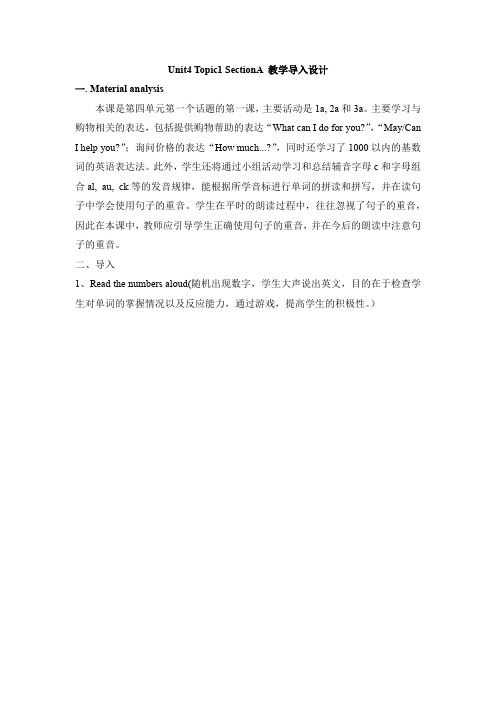
Unit4 Topic1 SectionA 教学导入设计
一. Material analysis
本课是第四单元第一个话题的第一课,主要活动是1a, 2a和3a。
主要学习与购物相关的表达,包括提供购物帮助的表达“What can I do for you?”,“May/Can I help you?”;询问价格的表达“How much...?”,同时还学习了1000以内的基数词的英语表达法。
此外,学生还将通过小组活动学习和总结辅音字母c和字母组合al, au, ck等的发音规律,能根据所学音标进行单词的拼读和拼写,并在读句子中学会使用句子的重音。
学生在平时的朗读过程中,往往忽视了句子的重音,因此在本课中,教师应引导学生正确使用句子的重音,并在今后的朗读中注意句子的重音。
二、导入
1、Read the numbers aloud(随机出现数字,学生大声说出英文,目的在于检查学生对单词的掌握情况以及反应能力,通过游戏,提高学生的积极性。
)。
新版新视野大学英语读写教程Unit1 Section A 教案
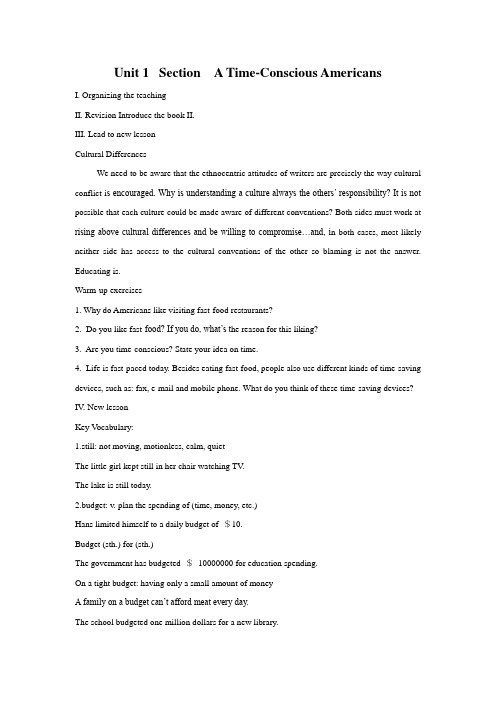
Unit 1 Section A Time-Conscious AmericansI. Organizing the teachingII. Revision Introduce the book II.III. Lead to new lessonCultural DifferencesWe need to be aware that the ethnocentric attitudes of writers are precisely the way cultural conflict i s encouraged. Why is understanding a culture always the others’ responsibility? It is not possible that each culture could be made aware of different conventions? Both sides must work at rising above cultural differences and be willing to compromise…and, i n both cases, most likely neither side has access to the cultural conventions of the other so blaming is not the answer. Educating is.Warm-up exercises1. Why do Americans like visiting fast-food restaurants?2. Do you like fast-food? If you do, what’s t he reason for this liking?3. Are you time-conscious? State your idea on time.4. Life is fast-paced today. Besides eating fast-food, people also use different kinds of time-saving devices, such as: fax, e-mail and mobile phone. What do you think of these time-saving devices? IV. New lessonKey V ocabulary:1.still: not moving, motionless, calm, quietThe little girl kept still in her chair watching TV.The lake is still today.2.budget: v. plan the spending of (time, money, etc.)Hans limited himself to a daily budget of $10.Budget (sth.) for (sth.)The government has budgeted $10000000 for education spending.On a tight budget: having only a small amount of moneyA family on a budget can’t afford meat every day.The school budgeted one million dollars for a new library.She is extremely busy, so she has to budget her time carefully.3.sense: bring sb. to his sensesPerhaps it will bring him to his senses.come to one's senses We hope he'll come to his senses and correct his mistakes.in a sense You are right in a sense.in one's right senses No one in his right senses would believe such a fantastic story.make sense This sentence doesn't make sense.make sense of Can you make sense of what this writer is saying?no sense No sense in looking for the coin under the table, you won't find it there.out of one's senses He must be out of his senses if he thinks I'm going to let him stay in my house. talk sense He talked a great deal of sense.4.pressure: at high pressure Sometimes he had to work at high pressure.under the pressure of Under the pressure of the urgent circumstances, he had to resign.5.abrupt adj. 1) (of behavior) rough 2) sudden and unexpectedeg. an abrupt attitude an abrupt change of policy an abrupt drop in oil pricesWhen I asked her about her new job, she was quite abrupt with me.The meeting came to an abrupt end.6.convention(1) (C. n.) conference of members of a profession political party, etc.hold a convention; a teachers’ / dentists’ convention(2) (U. n.) general, usu unspoken, agreement about how people should act or behave in certain circumstancesConvention dictates that a minister should resign in such a situation. By convention the deputy leader is always a woman.7.consequence(1) (c. n.) thing that is a result or an effect of sth. be ready to take/suffer/bear the consequences of one’s actions have far-reaching consequences for the country’s economy(2) (u. n.) importance It is of no consequence. Consequently adv. as a result; thereforeMy car broke down and consequently I was late.8.device (1) n. thing made or adapted for a special purposesa device for measuring pressure, an explosive device.(2) scheme; trickHer illness is merely a device to avoid seeing him.9.significance n. (1) (u. n.) meaning What’s the significance of a remark / this symbol?(2) importance Few people realized the significance of the discovery.Significantly adv. to an important or considerable degree Profits have risen significantly.10.conduct (1) v. lead or guide (sb./ sth)I asked the attendant to conduct him out / to the door.(2) direct (sth., the performance of a piece of music),control; manageHe was appointed to conduct the advertising campaign.Conductor n.11.settle: settle downUncle George didn't settle down until he was nearly fifty.settle for We reached the hotel late and had to settle for a room without a view.settle in I haven't yet settled in in my new job.settle on We must settle on a place to meet.settle up He settled up with the waiter.12.whereas conj. but, in contrast: whileEg. Their country has plenty of oil, whereas/ while ours has none.pare: worth, worthy, worthwhileworth It is worth (doing) sth.worthy Sth. is worthy of + n. /being done /to be done(be worthy of: merit, deserve) worthwhile It is worthwhile doing/to do sth.Eg. The matter is worth consideration/considering.The matter is worthy of consideration/being/to be considered.It is worthwhile considering/to consider the matter.1. fall behind:1) become bit by bit further behind2) (with) fail to finish at the proper timeDon't fall behind with your rent.You are sure to fall behind the other students if you don’t work hard enough. He didn't want to fall behind in his studies.He could have finished it on schedule, but somehow he fell behind.1) fall behind in science fall behind one’s competitors2) fall behind with the rentThe student has been working hard for fear that he should fall behind.I’m falling behind with my work; I must try to catch up.2. result in: Eating too much often results in sickness.Such behavior is likely to result in the manager's being dismissed.Rich does not result in happiness.Your diligence will absolutely result in great achievements.result from sth.: occur as a resultHe has injuries resulting from a fall.Result in sth. :have a specified effect or consequenceOur effects resulted in success/failure.result in have as a result; causeresult from b e caused byv. Acting before thinking always results in failing.v.The accident resulted in the death of two peoplev.Nothing has resulted from his efforts.v .The child’s illness resulted from eating unclean food.3. nothing but: Nothing but a miracle can save her life.There is nothing but he can do. (=There is nothing that he can't do.) Nothing but disaster would come from such a plan.He did nothing but eat and sleep all day.4. go with: Happiness doesn't necessarily go with money.Do you think this hat would go with my new dress?5. much less: I can hardly walk, much less run."I didn't even see him, much less speak to him."much less (also still less) and even less likelyEg. She wouldn’t take a drink, still/much less stay for dinner.6. small talk: She loves to have some small talk with the neighbors.7. at hand: I haven't my book at hand. He believes that the great day is at hand.8. due to: Her absence was due to the storm.due to sth./sb.: caused by sb./sth. because of sb. /sth.The team’s success was L argely due to her efforts.Due to/owing to /because of/ on account of9. given (that) prep. taking into accountNotice that “given” is followed by a noun phrase, while “given that” is followed by a finite clause. Eg. Given her interest in children, teaching should be the right career for her.10. in one’s eyes: in the opinion or judgment of someoneEg. The expert is always right in the eyes of everybody.V. Exercises:1.Listen and Talk2. Discussion1) Americans have a saying “Time is money.” How do you understand it?2) In America, there’s another saying about time: “We are slaves to nothing but the clock.” How do you understand this saying?VII. Text Analysis: Main Idea and Devices for Developing ItCentral topic:Time-conscious Americans (“Time is o ne of the two elements that Americans save carefully, the other being labor” Para. 1)Structure Analysis:Americans save time carefully. (Para. 1)Americans’ attitude towards time and how they try to save time in daily life and in business (Paras. 2-7)Time is a precious source.(Para. 2)Americans save time in their daily life.(Para.3)Americans save time in doing business. (Para.4)Americans produce labor-saving devices in order to save time.(Paras.5-7)It is taken as a sign of skillfulness or being competent to solve a problem or fulfill a job successfully with speed in the US. (Para.8)Stucture of the Text:VI. Reading Sills:1.Deduction organizationGeneral statement: “Time is one of the two elements that Americans save carefully, the other being la bor.”Specific statements:1) (Para. 3) In the US everyone seems to be in a rush in daily life, e.g. shopping, eating out, walking, driving a car, etc.2) (Para. 4) Americans start talking business directly without opening exchanges.3) (Paras. 5-7) Americans work hard at the task of saving time by producing a steady flow of labor-saving devices, e.g. faxes, phone calls, emails, etc.Conclusion : (Para.8) It is taken as a sign of skillfulness or beingcompetent to solve a problem or fulfill a job with speed in the US.2. Exemplification (Illustration)Typical sentences:1) (Para. 3) “City people always appear to be hurrying to get where they are going…Racing through daytime meals is part of life …You also find drivers will be abrupt and people will pus h past you.”2) (Para. 4) “Many new arrivals to the States will miss the opening exchanges of a business call, for example. They will miss the ritual interaction… They may miss leisurely business chats…”3. Comparison & contrastIn order to make it clear that Americans are time-conscious, the text compares the different conventions of other countries (“new arrivals”) with the Americans’ attitude towards time.1) (Para. 4) “Many new arrivals…will miss the ritual interaction that goes with a welcoming cup of tea or coffee that may be a convention in their own country… Normally, Americans do not assess their visitors in such relaxed surroundings…”2) (Para. 6) “In some countries no major business is conducted without eye contact, requiring a face-to-face conversation. In America, too, a final agreement will be normally signed in person.However, people are meeting increasingly on television screens, …”3) (Para. 8) “Some new arrivals will come from cultures where it is considered impolite to work too quickly… I n the US, however, it is taken as a sign of skillfulness or being competent to solve a problem or fulfill a job successfully, with speed.”4. Cause & effectTypical sentences:1) (Para. 3) “…Don’t take it personally. This is because people value time high ly, and they resent someone else “wasting” it beyond a certain appropriate point.”2) (Para. 4) “…Since we generally assess and probe professionally rather than socially, we start talking business very quickly. Time is, therefore, always ticking in our in ner ear.”3) (Para. 5) “Consequently, we work hard at the task of saving time…We, therefore, save most personal visiting for after-work hours or for social weekend gatherings.”4) (Para. 7) “… This is due partly to the fact that the telephone service is superb here, whereas the postal service is less efficient.”5) (Para. 8) “Unless a certain amount of time is allowed to elapse, it seems in their eyes as if the task being considered were insignificant, not worthy of proper respect. Assignments are, consequently, felt to be given added weight by the passage of time. ”Specific details: ① teachers and pupils, specific meetings, discuss the protection of environment②City planners, environmental problems, into consideration③Factories, reduce pollution, at a high costReason: bad air and water pollution affect everyone, cities to survive, businesses to make a profitOther topics⑴ Time is a precious resource.⑵ Computers are of great use to our daily life⑶ English is becoming more important.VII.Homework1. Finish the exercises in Section A.2. Prepare for Section B.。
- 1、下载文档前请自行甄别文档内容的完整性,平台不提供额外的编辑、内容补充、找答案等附加服务。
- 2、"仅部分预览"的文档,不可在线预览部分如存在完整性等问题,可反馈申请退款(可完整预览的文档不适用该条件!)。
- 3、如文档侵犯您的权益,请联系客服反馈,我们会尽快为您处理(人工客服工作时间:9:00-18:30)。
新视野大学英语4第四版U n i t1s e c t i o n A教案-CAL-FENGHAI-(2020YEAR-YICAI)_JINGBIANUnit 1 Section ALove and logic: The story of a fallacyObjectives:To talk about love and logicTo further understand the textTo apply the phrases and patternsTo master the narrative essay writing skillContentsWarming-up ActivitiesText StudyLanguage ApplicationSummaryWarming-up ActivitiesLead-in1.What do you know about logic?When it comes to making a choice, many people tend to use rational and logical reasoning;Males are more rational than females;2. Do you think it is possible to deal with life in a completely rational and logical way?Rational world is not necessarily a wonderful one;Rational individuals can make choices that are bad news for others;It is ridiculous to deal with love in a logical way.Pre-reading Activities1. The following are some statements to test your reasoning ability. Tell whether the conclusions after the word “Therefore” are true (T), false (F), or uncertain (U). Write your answer on the line before each statement.number statements True or false 1All odd numbers are integers (整数). All even numbersare integers. Therefore, all odd numbers are evennumbers.2 There are no dancers that aren’t slim and no singersthat aren’t dancers. Therefore, all singers are slim.2. Listen to a short passage on logic, and fill in the missing information.Cultural Background- Logic and Fallacy● 1. What is a fallacy And how is it usedAn error in reasoning that renders an argument logically invalid;By accident or design, logical fallacies are often used in debate or propaganda;To mislead people;To distract people from the real issue for the purpose of winning an argument.● 2. How many types of fallacy do you know?Red Herring (转移话题)/Begging the Question(循环论证)/Slippery Slope (滑坡谬误)/Bandwagon (从众谬误)/False Dilemma (伪两难谬误)/False Cause(post hoc) (假因谬误)/Ad Hominem ( 人身攻击)/Appeal to Authority (诉诸权威)/Dicto Simpliciter (绝对判断)/Hasty Generalization (草率结论)/AdMisericordiam (文不对题)/False Analogy (错误类比)Text Study1. Main idea and structure✧What did the narrator do with his roommate Rob (Para.1)They made a deal that the narrator gives Rob his leather jacket, and Rob, inexchange, gives the narrator his girlfriend.✧Why did the narrator want to have Polly as his girl friend (Paras. 2-3)Pretty, well-off, radiant;The right background to be the girlfriend of a dogged, brilliant lawyer;Help the narrator in his competition with other applicants to some elite law firms.●Part I — Paras. 1–3The author sets the scene of the story by providing information about the four “wh-” words: who, where, what, and why. “Who” refers to the narrator, his roommate Rob, and the beautiful girl Polly. “Where” refers to . “What” and “why”refer to what to do and why to do it: The narrator decides to make Polly“” because as a promisingly brilliant lawyer, he wants to have a girlfriend who is not only beautiful but also intelligent.●Part II — Paras. 4-25The narrator tries to help Polly become smarter by giving her lessons in logic. Altogether he spends five nights teaching Polly four logical fallacies , namely, Dicto Simpliciter,Hasty Generalization , Ad Misericordiam, False Analogy.●Part III — Paras. 26-43When asked to be the narrator’s girl friend, Polly refutes his arguments with the exact logical fallacies taught by him and refuses by making full disclosure that she is dating the narrator simply because it is a trick she and Rob have decided to play on him in order to get his leather jacket .2. Structure of the text3. Summary of the text4. Practical phrasesLove and logic: The story of a fallacyMy roommate Rob made a pact with me that he’d give me his girlfriend Polly in exchange for my jacket. And I agreed.Polly had the right background to be the girlfriend of a dogged, brilliant lawyer like myself. She was pretty, well-off, and radiant. Still, I want to dispense her enough pearls of wisdom to make her “well-spoken”.So I tried my best to teach her such logical fallacies as Dicto Simpliciter, Hasty Generalization, Ad Misericordiam, and False Analogy. After five nights of diligent work, I actually made a logician out of Polly. She was an analytical thinker at last.When I asked her to develop our relationship into a romantic one, however, she refuted my arguments as those logical fallacies I had taught her! And she refused my proposition by making full disclosure: She liked Rob in leather, therefore, she had told him to make the pact with me so that Rob could have my jacket .5. Functional patternsCritical thinking:What does the story tell us about loveAnd what does it tell us about smart people?Can you think of a logical fallacy you have committed Why is it a fallacy and what caused it。
